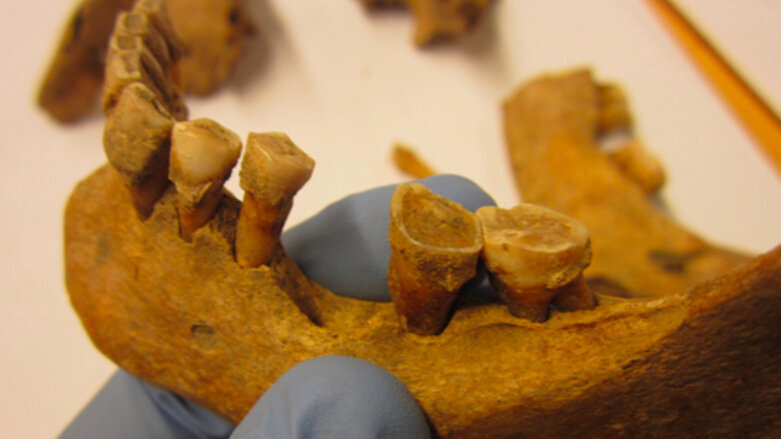COPENHAGEN, Denmark: A number of recent studies have shown that dental calculus from archaeological samples could be a rich source for better understanding the dental health of our ancestors. Similarly, a new study of the calculus of remains buried in a Danish cemetery has shed light on the oral microbiomes of certain groups of medieval humans in the area.
A team from the University of Copenhagen led the study and sampled calculus from the remains of 21 humans buried circa 1100–1450 CE in the medieval cemetery of the village Tjærby, Denmark. A total of 3,671 proteins from 220 different protein groups were identified from the calculus, with approximately 85 to 95 per cent produced by bacteria from the oral microbiome.
Although all of the studied samples showed traces of bacteria associated with periodontal disease and dental caries, the team was able to divide the samples into two groups: one that was health-predisposed and the other more susceptible to oral disease. In the former group, there was just one case of periodontitis, whereas seven members of the latter group displayed signs of severe tooth decay. Since the two groups were more than likely to have had similar diets and oral health habits, the difference in oral health outcomes is likely to be attributed to differences in proteins, such as Streptococcus sanguinis, a relatively harmless bacteria that was far more prevalent in the former group’s oral microbiomes.
Despite these differences, the calculus samples that were used were found to be far more heterogeneous than samples gathered from modern Danish individuals. The study’s authors argued that the increased diversity of modern diets, combined with environmental and lifestyle factors, genetics, hygiene practices and different personal histories of antibiotics use were likely to be the main causes of the variety in modern oral microbiomes.
The study, titled “Quantitative metaproteomics of medieval dental calculus reveals individual oral health status”, was published online in Nature Communications on 20 November 2018.
Tags:
VANCOUVER, British Columbia, Canada: Dental caries represents one of the most common chronic diseases in young children and is a multifactorial disease. ...
NEW YORK, US: Oral diseases and depression are both projected to rise in prevalence over the coming decades, and recent findings suggest the two may be ...
COPENHAGEN, Denmark: Though its popularity and constituent ingredients have changed over time, chewing gum has been used by humans for thousands of years. A...
FARMINGTON, Conn., U.S.: Numerous studies have established that oral health can play a significant role in systemic health. A new review study has found ...
ISTANBUL, Turkey: Prof. Gerry McKenna is a faculty member in the School of Medicine, Dentistry and Biomedical Sciences at Queen’s University Belfast, ...
PROVO, Utah, U.S.: Researchers from Brigham Young University (BYU) in the U.S. have found that students are more engaged in course material and learning ...
NEW DELHI, India: While the effects of climate change on general health are well documented, its impact on oral health remains less explored. A new scoping ...
ANTWERP, Belgium: Research has found conflicting results regarding whether the popular bactericidal mouthwash LISTERINE promotes or undermines a healthy ...
BRISBANE, Australia: There is much debate of the pros and cons of breast- and bottle-feeding. A research team from the Queensland University of Technology ...
SAN FRANCISCO, US: Physical intimate partner violence (IPV) can be especially detrimental during pregnancy and is a significant public health issue, having ...
Live webinar
Tue. 3 March 2026
11:00 am EST (New York)
Dr. Omar Lugo Cirujano Maxilofacial
Live webinar
Tue. 3 March 2026
8:00 pm EST (New York)
Dr. Vasiliki Maseli DDS, MS, EdM
Live webinar
Wed. 4 March 2026
12:00 pm EST (New York)
Munther Sulieman LDS RCS (Eng) BDS (Lond) MSc PhD
Live webinar
Wed. 4 March 2026
1:00 pm EST (New York)
Live webinar
Fri. 6 March 2026
3:00 am EST (New York)
Live webinar
Tue. 10 March 2026
4:00 am EST (New York)
Assoc. Prof. Aaron Davis, Prof. Sarah Baker
Live webinar
Tue. 10 March 2026
8:00 pm EST (New York)
Dr. Vasiliki Maseli DDS, MS, EdM



 Austria / Österreich
Austria / Österreich
 Bosnia and Herzegovina / Босна и Херцеговина
Bosnia and Herzegovina / Босна и Херцеговина
 Bulgaria / България
Bulgaria / България
 Croatia / Hrvatska
Croatia / Hrvatska
 Czech Republic & Slovakia / Česká republika & Slovensko
Czech Republic & Slovakia / Česká republika & Slovensko
 France / France
France / France
 Germany / Deutschland
Germany / Deutschland
 Greece / ΕΛΛΑΔΑ
Greece / ΕΛΛΑΔΑ
 Hungary / Hungary
Hungary / Hungary
 Italy / Italia
Italy / Italia
 Netherlands / Nederland
Netherlands / Nederland
 Nordic / Nordic
Nordic / Nordic
 Poland / Polska
Poland / Polska
 Portugal / Portugal
Portugal / Portugal
 Romania & Moldova / România & Moldova
Romania & Moldova / România & Moldova
 Slovenia / Slovenija
Slovenia / Slovenija
 Serbia & Montenegro / Србија и Црна Гора
Serbia & Montenegro / Србија и Црна Гора
 Spain / España
Spain / España
 Switzerland / Schweiz
Switzerland / Schweiz
 Turkey / Türkiye
Turkey / Türkiye
 UK & Ireland / UK & Ireland
UK & Ireland / UK & Ireland
 Brazil / Brasil
Brazil / Brasil
 Canada / Canada
Canada / Canada
 Latin America / Latinoamérica
Latin America / Latinoamérica
 USA / USA
USA / USA
 China / 中国
China / 中国
 India / भारत गणराज्य
India / भारत गणराज्य
 Pakistan / Pākistān
Pakistan / Pākistān
 Vietnam / Việt Nam
Vietnam / Việt Nam
 ASEAN / ASEAN
ASEAN / ASEAN
 Israel / מְדִינַת יִשְׂרָאֵל
Israel / מְדִינַת יִשְׂרָאֵל
 Algeria, Morocco & Tunisia / الجزائر والمغرب وتونس
Algeria, Morocco & Tunisia / الجزائر والمغرب وتونس
 Middle East / Middle East
Middle East / Middle East











































To post a reply please login or register